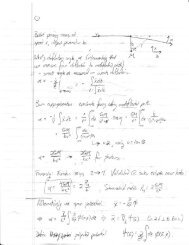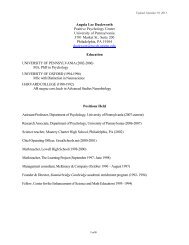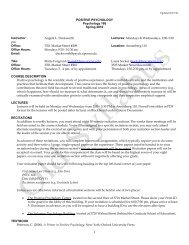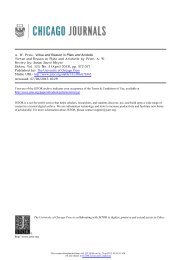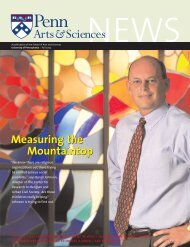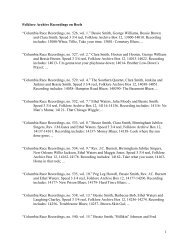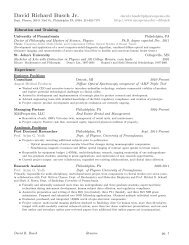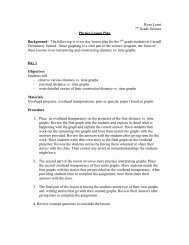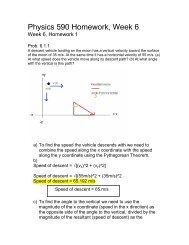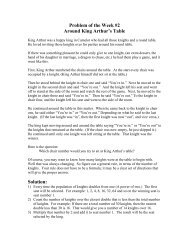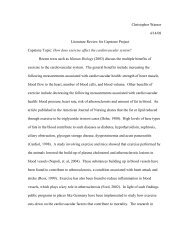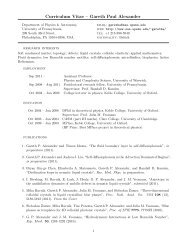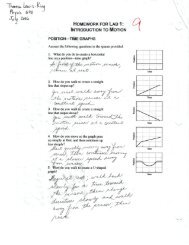PENN SUMMER - University of Pennsylvania
PENN SUMMER - University of Pennsylvania
PENN SUMMER - University of Pennsylvania
You also want an ePaper? Increase the reach of your titles
YUMPU automatically turns print PDFs into web optimized ePapers that Google loves.
and natural sciences, and to anthropological practice. The course is<br />
structured around a series <strong>of</strong> themes and concepts central to anthropological<br />
inquiry. We will read both classic and modern theoretical<br />
approaches to those themes and will discuss the various strengths and<br />
weaknesses <strong>of</strong> each approach, keeping in mind the contexts within<br />
which each approach was introduced. We will also consider questions<br />
<strong>of</strong> ethnographic methods and ethics. By the end <strong>of</strong> the course, students<br />
should feel comfortable discussing and applying a wide range<br />
<strong>of</strong> theoretical perspectives, have a strong grasp on the relationship<br />
between theory and practice, have a sense <strong>of</strong> the principal debates<br />
within the discipline, and be able to explain why these debates tend<br />
to remain unresolved.<br />
These courses, <strong>of</strong>fered by other programs in LPS, are also suitable for<br />
MLA students. Course information can be found in other sections <strong>of</strong> this<br />
course guide.<br />
enVs 653 960 Tr 5:30pm–8:10pm riebling<br />
Town or Country: Warring Ideologies on Living<br />
the Good Life<br />
russ 432 920 Tr 6:00pm–9:00pm Zubarev<br />
Fate and Chance in Literature and Culture<br />
urBs 412 920 Tr 5:30pm–8:40pm gerig/guard<br />
Building Non-Pr<strong>of</strong>its from the Ground Up<br />
Master <strong>of</strong> science in<br />
Applied Geosciences<br />
The Master <strong>of</strong> Science in Applied Geosciences is designed to enhance<br />
the skills <strong>of</strong> practicing engineers and geologists by exposing them to<br />
current practices in the fields <strong>of</strong> hydrology, hydrogeology, environmental<br />
geology, soil science, geophysics, geochemistry and engineering<br />
geology. Students may concentrate in hydrogeology, engineering<br />
geology, environmental geology, or develop an independent curriculum<br />
under the guidance <strong>of</strong> an advisor. For more information, contact<br />
Program Director Dr. Yvette Bordeaux, bordeaux@sas.upenn.edu.<br />
12-week Summer Session<br />
MAY 24–AuGusT 13, 2010<br />
geol 602 990 M 6:00pm–9:00pm Calabria<br />
Geotechnics: Introduction to Geotechnical<br />
Engineering<br />
The course begins with a study <strong>of</strong> the Earth’s composition, the formation<br />
<strong>of</strong> soil materials by the weathering process (physical and chemical),<br />
and a discussion <strong>of</strong> soil mineralogy, and clay minerals. Following<br />
this introduction, soil classification systems and physical properties<br />
<strong>of</strong> soils will be presented, as well as the state <strong>of</strong> stress in a soil mass<br />
together with seepage theory and groundwater flow. The technical<br />
portion <strong>of</strong> the course will include the development <strong>of</strong> consolidation<br />
theory and analyses, shear strength theory, lateral earth pressure theory<br />
and application, and slope stability analysis. The course will conclude<br />
with the presentation <strong>of</strong> two case history sessions, presenting<br />
applications <strong>of</strong> geotechnical engineering practice and the influence <strong>of</strong><br />
the geologic setting.<br />
geol 655 990 r 6:00pm–9:00pm doheny<br />
Engineering Geology<br />
Engineering properties <strong>of</strong> earth materials; engineering testing, classification<br />
and use <strong>of</strong> earth materials; geologic and geophysical investigations<br />
and monitoring; geologic hazards; planning and use <strong>of</strong> the<br />
geologic environment.<br />
geol 656 990 T 6:00pm–9:00pm Mastropaolo<br />
Fate and Transport <strong>of</strong> Pollutants<br />
Prerequisite(s): Intro to Hydrology<br />
This course covers basic groundwater flow and solute transport modeling<br />
in one, two-, and three-dimensions. After first reviewing the<br />
principles <strong>of</strong> modeling, the student will gain hands-on experience<br />
by conducting simulations on the computer. The modeling programs<br />
used in the course are MODFLOW (USGS), MT3D, and the US<br />
Army Corps <strong>of</strong> Engineers GMS (Groundwater Modeling System).<br />
geol 659 990 W 6:00pm–9:00pm Bellini<br />
Surface Water Hydrology<br />
This course will focus on various aspects <strong>of</strong> surface water hydrology.<br />
Topics covered include: study <strong>of</strong> all aspects <strong>of</strong> precipitation and<br />
run<strong>of</strong>f; study <strong>of</strong> the natural occurrences <strong>of</strong> floods and droughts; the<br />
establishment <strong>of</strong> design floods; methods <strong>of</strong> preventing or alleviating<br />
damages due to floods; water losses through evaporation, transpiration,<br />
and infiltration; storm water management; and hydrologic considerations<br />
in environmental issues.<br />
These courses, <strong>of</strong>fered by other programs in LPS, are also suitable for<br />
MSAG students. Course information can be found in other sections <strong>of</strong><br />
this course guide.<br />
enVs 610 960 W 5:30pm–8:10pm Willig<br />
Regional Field Ecology<br />
enVs 616 960 T 5:30pm–8:10pm Chu<br />
Managing Environmental Risks in an Uncertain<br />
World<br />
MAsTer oF sCieNCe iN APPLied GeosCieNCe 47



